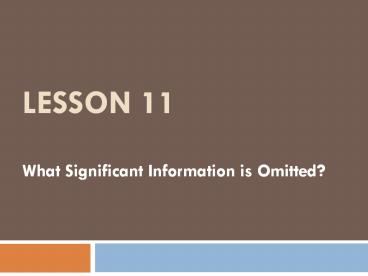Lesson Eleven - PowerPoint PPT Presentation
Title:
Lesson Eleven
Description:
Lesson Eleven – PowerPoint PPT presentation
Number of Views:444
Title: Lesson Eleven
1
Lesson 11
- What Significant Information is Omitted?
2
Introduction
- Sometimes people try to hide important
information. - As critical thinkers we understand that it is
very important that we gather as much information
as possible before making a decision.
3
Introduction
- People generally tell us only the information
they want us to know. They focus on the positive
characteristics. - They will omit (or leave out) the more negative
characteristics. - Critical thinking requires that we search for the
omitted (or hidden) information. - How?
- By asking the questions, and applying the skills,
we have learned in the previous lessons.
4
Introduction
- We react to an incomplete picture of an argument
when we try to judge it based only on its stated
parts. - To react to the complete picture of an argument
we must get all of the important information that
we need. - Information that would affect whether or not you
should accept or reject a particular argument.
5
Introduction
- The critical question What significant
information is omitted? - Benefits of detecting omitted information.
- Most of the information we encounter on a daily
basis has a purpose. - Its organization was chosen and organized by
someone who hoped that it would affect your
thinking on something. - Always slow down and think about what the
communicator has not told you.
6
Introduction
- The certainty of incomplete reasoning
- We encounter incomplete reasoning every day of
our lives. Why? - Limitations imposed on people by space and time.
- Most people have limited attention spans.
Therefore communicators will often abbreviate
their information. - Nobody knows everything about everything. The
communicator is always limited in his/her
knowledge.
7
Introduction
- The certainty of incomplete reasoning
- We encounter incomplete reasoning every day of
our lives. Why? (cont). - Certain individuals (advertisers, salesmen,
politicians, etc) advantage by not providing all
of the important information. - Peoples values, beliefs, and attitudes will
affect the information people give you and what
information they will omit.
8
Asking the Right Questions To Identify Omitted
Information
- The questions you need to ask are
- questions that will help you decide what
additional information you need. - questions that will reveal that information.
- There are many different kinds of questions you
can use. - You can ask questions about ambiguous (unclear)
words or phrases, about the assumptions that are
being made in the argument, etc.
9
Asking the Right Questions To Identify Omitted
Information
- Lets examine some of the more common types of
omitted information and some questions that might
help us uncover that information. - Open your textbooks to page 151.
- This is a very helpful series of omissions and
questions.
10
Importance of the Negative View
- The potential negative character of, or
consequences of, a particular action or product. - Often the negative view is omitted because it
goes against the promotion. - Often omitted.
- Look on pages 152-153 for example.
11
The Missing Information
- Sometimes omitted information cannot be
uncovered. - Can we make a decision based on the available
information? - Since reasoning is always incomplete, we are
always forced to do this .
12
Group Work
- Passage 3 Page 154.
13
Homework
- Watch a TV. commercial
- Make a list of important information that was
omitted. - If you can find it on YouTube, email the link to
the instructor and we will watch the commercial
in class. - Read Chapter 13.
14
THE END































